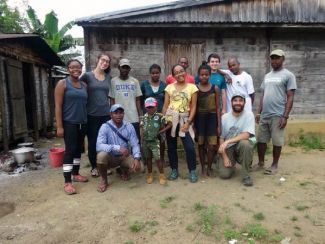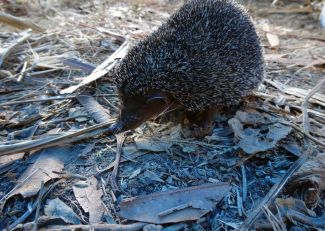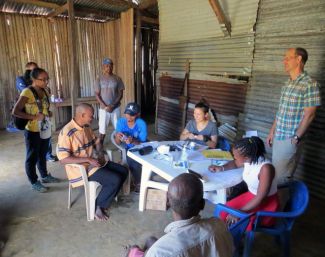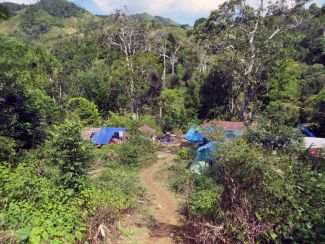Mammals, Diseases and the Human Dimension: Collaborative Research in Madagascar
November 12, 2018

Madagascar can be a tremendously rewarding place to visit and do research. The people and their culture are awe-inspiring, the landscapes are picturesque and the wildlife is unparalleled. Madagascar can also be a tremendously difficult place to be: in the rural countryside, there is no electricity unless you have solar power or a gas generator, running water means a stream or river and unlike what we see on Planet Earth, wildlife can be hard to find.
From June to August 2018, I had the great pleasure of leading a Bass Connections research project in northeast Madagascar. The co-leaders, Charles Nunn and Randall Kramer, supervised the global health and sociological facets of the project, while I managed the ecological dimension. The team from Duke included three undergraduates, one medical student and four faculty and research staff.
Our project investigates the infectious diseases of mammals in the region and how the transmission of disease can be related to changes in species dynamics.
In Madagascar, we collaborate with two Malagasy NGOs, one graduate student, six research assistants from a rural community and countless friends, family members and revered village elders from the villages of Mandena and Manantenina. We had enormous help from the Duke Lemur Center’s SAVA Conservation Initiative (DLC-SAVA), helping organize the team members, facilitate and solidify relationships with the villages. The students got to meet the DLC staff in Sambava: Marina Blanco and Lanto Andrianandrasana. Lanto provided crucial logistical support before, during and after the project. DLC conservation coordinator Charlie Welch was able to visit the team in camp and brought a Duke Alumni Travel tour group to hear presentations from the students.
This was my sixth trip to Madagascar, but it was my first time leading a team of American and Malagasy students and assistants for a full two-month research program. It was a unique opportunity that offered new adventures and possibilities. The students, Ryan, Ajilé, Lisa and Sachi, had all been abroad to wild, far-flung places, but had never been to Madagascar. The combinations of our experiences, interests and knowledge led to a great trip that produced an interdisciplinary dataset, great stories and tight bonds with people across the globe.
Our project investigates the infectious diseases of mammals in the region and how the transmission of disease can be related to changes in species dynamics. Our mission this year was to branch out to understand mammal and disease diversity in new sites and begin to capture the human dimension of the equation.
The combinations of our experiences, interests and knowledge led to a great trip that produced an interdisciplinary dataset, great stories and tight bonds with people across the globe.
 Ryan and Lisa focused most on trapping rodents and tenrecs. Lisa is interested in what kinds of indigenous mammals live in human habitats, like rice fields. Ryan meticulously counted the number of tick, mite and flea species on small mammals in different habitat types. Ajilé took on a whole new angle of our project, investigating how human social relationships, education, land use and economics are related to their health and susceptibility to diseases. She worked closely with Fifi, a graduate student from Madagascar, to interview people in their homes and fields. This interdisciplinary team gelled to create a synthesis of viewpoints and ideas that has the potential to move the fields of disease ecology and public health forward.
Ryan and Lisa focused most on trapping rodents and tenrecs. Lisa is interested in what kinds of indigenous mammals live in human habitats, like rice fields. Ryan meticulously counted the number of tick, mite and flea species on small mammals in different habitat types. Ajilé took on a whole new angle of our project, investigating how human social relationships, education, land use and economics are related to their health and susceptibility to diseases. She worked closely with Fifi, a graduate student from Madagascar, to interview people in their homes and fields. This interdisciplinary team gelled to create a synthesis of viewpoints and ideas that has the potential to move the fields of disease ecology and public health forward.
The research resulted in almost 300 small mammal captures. We caught numerous native species, even in rice fields and small patches of forest, including the hedgehog tenrec. We also captured non-native species including 155 black rats – an introduced rodent that invades homes, fields and forests and is known to spread diseases. We collaborate with epidemiologists on the Indian Ocean island of La Réunion, to test the animal samples for diseases.
This interdisciplinary team gelled to create a synthesis of viewpoints and ideas that has the potential to move the fields of disease ecology and public health forward.
 Based on our previous results, we know that rats spread Leptospira, a water-borne bacterium that is passed through urine and spread through contaminated drinking water. This pathogen can cause kidney disease and even death. Our next steps will reveal if people get the same strains of Leptospira as rats, or if they are exposed to different strains from other mammals. We’re also testing for Rickettsia, a bacterium spread by ticks, to see how the ticks found on small mammals and domestic animals like dogs, cats, pigs and cows could spread to people.
Based on our previous results, we know that rats spread Leptospira, a water-borne bacterium that is passed through urine and spread through contaminated drinking water. This pathogen can cause kidney disease and even death. Our next steps will reveal if people get the same strains of Leptospira as rats, or if they are exposed to different strains from other mammals. We’re also testing for Rickettsia, a bacterium spread by ticks, to see how the ticks found on small mammals and domestic animals like dogs, cats, pigs and cows could spread to people.
The sociology team collected over 300 interviews about people’s social relationships, economics and health. Ajilé, Fifi and their Malagasy assistants Desire, Edouard and Tiomily expertly executed complex surveys that sometimes took up to one hour! But it wasn’t always easy to find people to interview – most people spend 12+ hours in their agricultural fields every day, or spend months guarding their remote vanilla fields to prevent theft. That meant long days of empty homes and quiet village streets, except for occasional children playing marbles or jumping rope. Despite many challenges, the sociology team amassed a wealth of information on the life ways of the local population, which will allow us to understand the risk factors for infectious diseases.
Being immersed in the Malagasy culture allowed us all to gain enriching perspective about the world views of our partners abroad.
 Living with our Malagasy collaborators in bush camps and in their villages, we grew close to them and their families. They invited us to celebrate holidays and traditional ceremonies with them, like Independence Day and a turning of bones memorial ritual. We all got to take part in farming and cooking practices and learned about the importance of vanilla agriculture. Being immersed in the Malagasy culture allowed us all to gain enriching perspective about the world views of our partners abroad.
Living with our Malagasy collaborators in bush camps and in their villages, we grew close to them and their families. They invited us to celebrate holidays and traditional ceremonies with them, like Independence Day and a turning of bones memorial ritual. We all got to take part in farming and cooking practices and learned about the importance of vanilla agriculture. Being immersed in the Malagasy culture allowed us all to gain enriching perspective about the world views of our partners abroad.
We are greatly indebted to the Malagasy collaborators in Mandena, Manantenina, DLC-SAVA, the Malagasy NGOs MICET and VAHATRA and the University of Antananarivo. The project would not be possible without the support of Bass Connections and the support staff of the Duke Global Health Institute. We look forward to following up at Duke University to analyze the data. We will produce academic articles about the results, and voice our recommendations for disease management in this system to the Ministry of Health and local communities in Madagascar.
This mission to Madagascar was full of new experiences that enriched our lives and strengthened our friendships and collaborations abroad. We hope to return and continue the research at Marojejy next year and bring another Bass Connections team. The successes of the 2018 Bass team have opened up new opportunities for the team next year.
Originally published in the October 2018 Duke Lemur Center-SAVA Conservation newsletter
Learn More
- Read about this project team, How Do People Affect Zoonotic Disease Dynamics in Madagascar?
- Browse the Bass Connections 2017-18 Annual Report.
- Check out additional teams in the Global Health and Energy & Environment themes.
